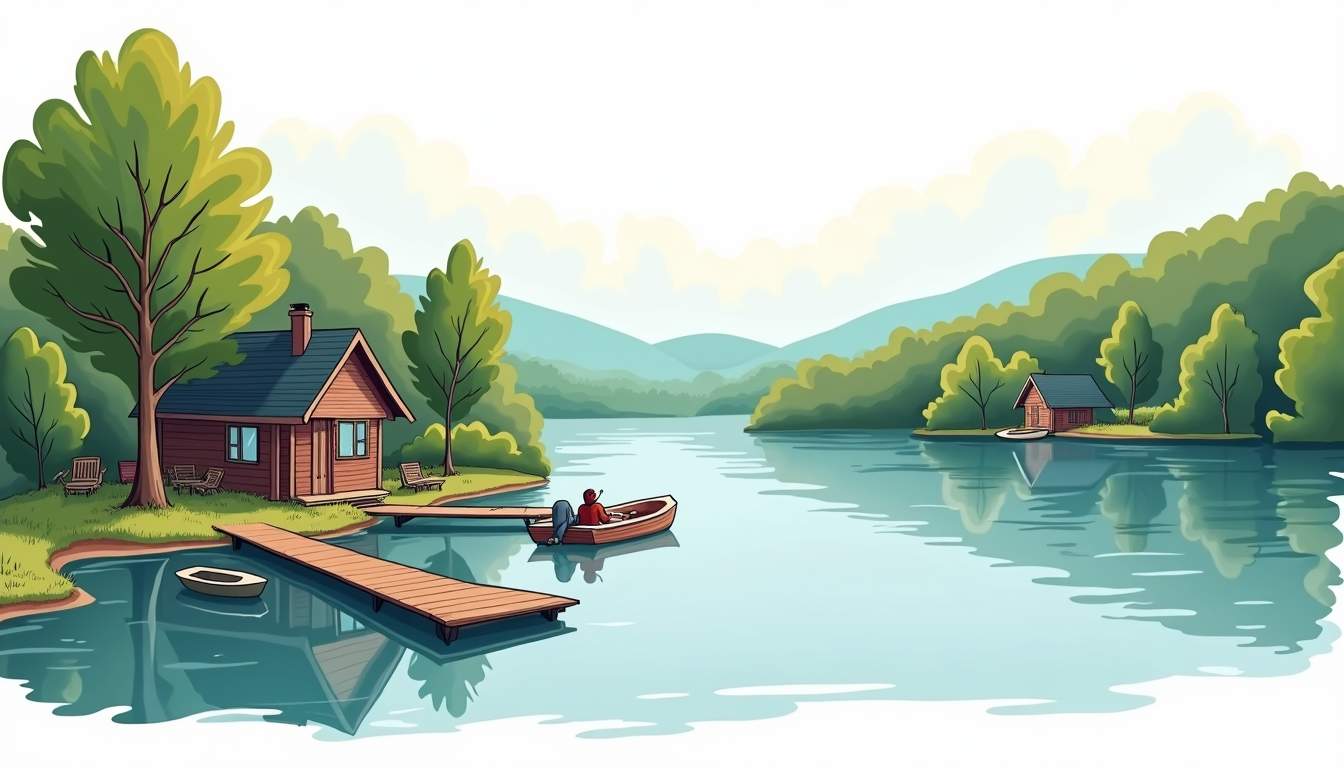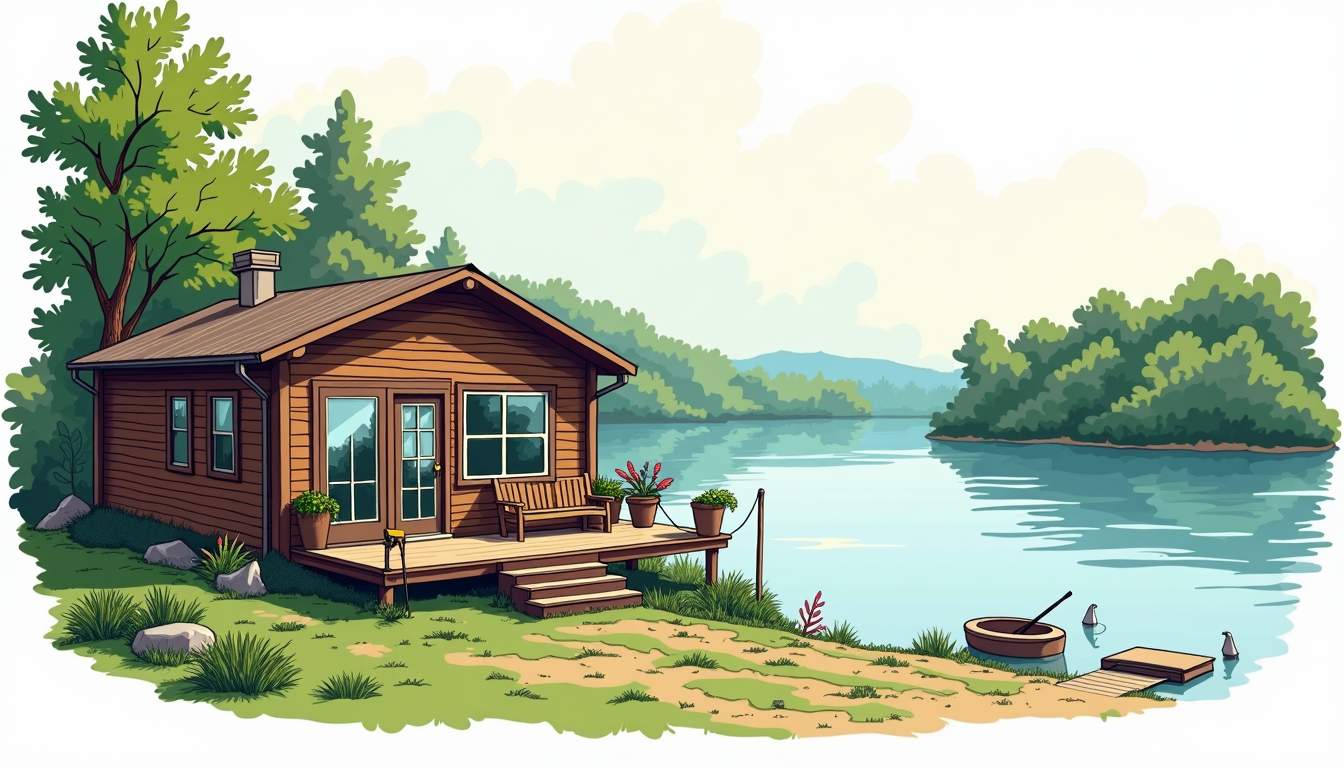
Tennessee has long been a favorite for buyers seeking lakefront escapes, year-round recreation, and investment opportunities tied to tourism and short-term rentals. This guide covers the essentials for understanding lake resort real estate in Tennessee — from the most popular lake regions to financing, seasonal considerations, and practical tips for buyers and investors.
Tennessee offers a combination of natural beauty, comparatively affordable land, and a friendly regulatory environment for second homes and vacation rentals. The state's lakes are often surrounded by rolling hills, forested shorelines, and small towns that balance tranquility with access to amenities.
Proximity to major metro areas like Nashville, Knoxville, and Chattanooga makes many lake properties convenient for weekend escapes. Additionally, warmer climates than much of the north mean a longer boating and outdoor season, boosting the appeal to buyers looking for recreational lifestyles or rental income.
Many lakes in Tennessee are man-made reservoirs created by the Tennessee Valley Authority, which means they are well-maintained and offer reliable access to clean water and recreational facilities. This infrastructure supports activities such as fishing, swimming, kayaking, and hiking along established trails. Popular lakes like Norris Lake, Douglas Lake, and Percy Priest Lake each have unique draws—from extensive waterfront real estate options to vibrant communities with restaurants and shops nearby.
Aside from natural and practical benefits, Tennessee's cultural richness adds to the area's attractiveness. Buyers often appreciate the blend of Southern hospitality, music heritage, and local festivals that enrich the lifestyle around these lakes. This vibrant social scene alongside outdoor recreation creates year-round appeal for families, retirees, and investors alike, fostering a strong sense of community and belonging.
Each lake region in Tennessee has a distinct character and market dynamic. Choosing the right area depends on priorities such as privacy, water activities, proximity to towns, or rental potential. Below are some of the most sought-after lakes and what they offer.
Dale Hollow is known for clear water, superb bass fishing, and rugged, wooded shorelines. The area tends to attract buyers seeking a more secluded, nature-focused retreat. Boat access and private coves are typical selling points.
Norris Lake offers extensive shoreline and a mix of upscale developments and rustic coves. The lake’s proximity to the Knoxville metro area supports both homeowners and vacation rental markets. Many properties include deep-water docks and panoramic lake views.
These lakes closer to the Knoxville and Chattanooga areas are popular with weekenders and families seeking shorter drives. They provide plentiful boating and fishing, and near-lake towns have grocery stores, marinas, and services essential for long-term enjoyment.
Located near Chattanooga, Chickamauga and Nickajack Lakes combine scenic cliffs and accessible waterfronts. The region draws buyers interested in water sports and easy access to city amenities, restaurants, and regional transportation.
Tims Ford in south-central Tennessee is celebrated for its calm coves, trout streams, and proximity to Winchester and Fayetteville. It appeals to buyers seeking both recreational fishing and a relaxed lake lifestyle with community activities.
Lake real estate spans a broad spectrum: from raw waterfront lots to fully furnished cabins, luxury homes with private docks, and condo-style developments with shared amenities. Understanding the differences helps align purchases with intended use — personal use, short-term rental, or long-term investment.
Waterfront homes command a premium for direct access to the water and unobstructed views. Considerations include shoreline stability, dock rights, and setback requirements. Waterfront ownership also often implies higher maintenance and flood insurance needs.
Properties a short distance from the water but with strong views can offer a balance of affordability and scenic benefit. These homes often avoid some of the high maintenance costs associated with direct waterfront parcels while still delivering the aesthetic value of lake living.
Smaller cabins and cottages are popular for affordable second homes and rental units. They tend to attract buyers who prioritize rustic charm and lower carrying costs, and they can perform well as short-term rentals in high-demand seasons.
Raw lots provide the most flexibility for custom builds but require due diligence on septic approvals, shoreline access, erosion control, and buildability. For buyers wishing to construct a dream home, a lot purchase can be a strategic first step.
Tennessee lake markets vary, but several trends are common: rising demand for second homes since the pandemic, a premium for true waterfront, and increased interest from out-of-state buyers. Pricing is influenced by lake popularity, proximity to cities, and the quality of local infrastructure.

In general, prices for modest cabins or small lake homes will be considerably lower than in high-cost coastal markets, but prime waterfront parcels and luxury developments can still reach six figures and beyond. Seasonality also affects listing times and price negotiation windows.
Financing lake properties follows many of the same rules as traditional residential loans, but lenders often apply stricter underwriting for waterfront properties and investment purchases. Down payments may be higher, and interest rates for non-owner occupied loans can be less favorable.

Conventional mortgages are common for primary residences; however, buyers should be prepared for additional documentation if the property will be used as a rental. Jumbo loans may be needed for high-end lakefront homes. Local credit unions and community banks that understand regional markets can be an advantage.
Property tax rates vary by county and can be affected by improvements like docks and boathouses. It’s important to check recent tax assessments and any special district levies for services such as road maintenance or lake management.
Flood risk, shoreline erosion, and storm exposure can affect insurance costs. Many insurers require flood insurance for low-lying waterfront homes. Structural and windstorm coverage should be reviewed carefully, and some regions may have limited carrier availability.
Several legal and practical factors are essential when purchasing lake property. Shoreline ownership, dock rights, riparian access, and easements are common issues that influence both enjoyment and resale value.
Understand whether a property includes riparian rights (the right to access and use the water directly from the parcel). Some lots may rely on community docks or shared access, which affects both convenience and liability.
Easements for utilities or road access can limit privacy and building locations. Homeowners associations may impose architectural standards and rental restrictions, so reviewing covenants and HOA financials is critical before buying.
Building near shorelines often requires permits and adherence to erosion control and septic setback rules. Wetlands or protected areas can restrict development. A local land survey and consultation with county planning or environmental agencies will clarify constraints.
Short-term rentals are a major draw in lake markets, especially in high-tourism areas. Properties that are turnkey, low-maintenance, and close to marinas or popular recreation tend to perform best as rental investments.
Regulations for short-term rentals vary by county and municipality. Some communities welcome vacation rentals, while others impose occupancy limits, licensing, or transient occupancy taxes. Confirm local rules early in the buying process to avoid surprises.
Expect strong demand in spring, summer, and fall for lake activities. Winter months may see lower occupancy unless the property offers year-round attractions like nearby ski areas or festivals. Marketing, professional photography, and quality amenities generally increase rental revenue.
Lake homes require ongoing attention to protect structures from moisture, pests, and seasonal wear. Dock maintenance, shoreline stabilization, and HVAC systems designed for high-humidity environments are common considerations.

For properties used seasonally, winterizing plumbing and HVAC systems is essential to prevent freeze damage. Periodic checks during the offseason reduce the risk of long-term problems and protect rental income for owners who rent during peak months only.
Maintaining a dock involves regular inspections of pilings, hardware, and decking. Shoreline erosion control may require riprap, vegetation, or engineered solutions. Check local guidelines before making structural changes to the shoreline.
Lake communities in Tennessee range from remote, off-grid enclaves to developed resort areas with restaurants, marinas, golf courses, and retail. Access to healthcare, schools, and grocery stores is an important factor for buyers planning extended stays or full-time residency.
Community events, farmers markets, and marina activities often create a lively social calendar in lakeside towns. Strong local services and a welcoming community enhance the long-term enjoyment and resale prospects of a lake property.
Before making an offer, gather the following to streamline decision-making: recent surveys, septic and well inspections, flood-zone determination, HOA documents, rental regulations, and a summary of annual maintenance costs. Having these items ready reduces the likelihood of unexpected hurdles.
It is also advisable to visit the property at different times of day and during both peak and off-peak seasons to assess noise, traffic, and seasonal water levels. A local real estate agent with lake expertise can help identify issues that are not immediately obvious to newcomers.
Lake resort real estate in Tennessee offers a compelling mix of outdoor recreation, investment potential, and varied lifestyles. Whether seeking a secluded cabin, a family-friendly waterfront home, or a rental property near popular marinas, careful research and due diligence are key to a successful purchase.
Understanding regional market dynamics, legal rights tied to shorelines, and the operational realities of maintaining a lake property will contribute to long-term satisfaction. With the right preparation, a Tennessee lake property can become a cherished retreat and a strong asset in a diversified portfolio.
Ready to elevate your Tennessee lake living experience? Tennessee National offers a unique blend of luxury and comfort within a premier gated community. Enjoy access to a Greg Norman Signature Golf Course, private marina, waterfront dining, and over 20 member amenities nestled in breathtaking natural surroundings. Whether you desire a move-in ready home or a custom build, Tennessee National provides exceptional options tailored to your lifestyle. Schedule a private tour today and start making memories daily in the heart of Tennessee’s most sought-after resort-style living.